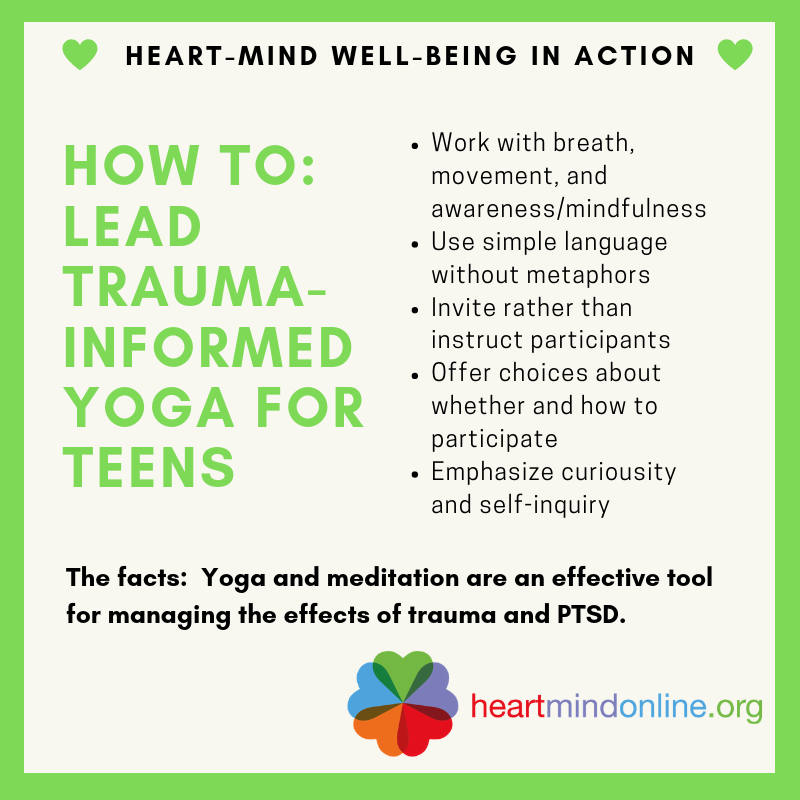In the words of Nicole Marcia, Vancouver-based trauma-informed yoga therapist:
"We are all trauma survivors."
We all experience grief and loss, violence and hearbreak, to a greater or lesser degree throughout our lives. While no one is immune, young people[1] are especially vulnerable to the trauma of everyday life[2] - particularly the experience of chronic stress.
Did you know that yoga is one tool that we can offer teens to help them ride the waves of traumatic experience, manage everyday stressors, and heal the wounds of past traumas?
Research has found that yoga and meditation[3] are an effective strategy for managing trauma symptoms. In fact, yoga and meditation can have a positive impact on those who have experienced trauma that is similar in magnitude to that of anti-anxiety medications or antidepressants[4].
How it works: When approached from a trauma-informed foundation, yoga provides the opportunity for youth to build awareness of their inner emotions and physical sensations. Doing so may lessen the severity of their trauma symptoms and help them cope with the sensory experience of stress.[5]
A trauma-informed approach to yoga:
- Works with breath, movement, and awareness/mindfulness
- Uses simple language without metaphors
- Invites rather than instructs participants
- Offers choices about whether and how to participate
- Emphasizes curiousity and self-inquiry
Heart-Mind Online partnered with trauma-informed yoga therapist Nicole Marcia to produce a two-part video series on helping teens cope with the effects of trauma.
In the second part of this series, featured above, Nicole Marcia introduces us to yoga as a tool for teens to use to manage stress - which is one of the most widespread symptoms of trauma, as well as a common root cause. Nicole then guides us through a simple and accessible 10-minute seated breath and movement practice that can take place anywhere one is comfortably seated, such as at a desk, in a car, or at home. This practice can be shown directly to young people as it does not contain triggering content or language, and is a great way to get started with trauma-informed practices in your classroom or family.
In case you missed it, be sure to check out the first video in this two-part series: A Heart-Mind Interview with Nicole Marcia! In this video, Heart-Mind Online sits down with trauma-informed yoga therapist Nicole Marcia to dive deep into what being trauma informed is - and isn't - and gains practical insight into how to build safety, compassion, and choice in our relationships with young people.

The Adverse Childhood Experiences Study found that experiencing trauma in childhood is linked to lifelong increased risk of violence, victimization, health problems, and early death.
In his bestselling book "The Trauma of Everyday Life", psychiatrist Mark Epstein explains how trauma is "an indivisible part of human experience," and provides insights from Western and Eastern psychology on how to cope with this difficult reality.
A 2014 study found that participating in a 10-week trauma-informed yoga program decreased the severity of PTSD symptoms in chronically traumatized American women.
Researchers hypothesized that this improvement was due to the way yoga enhances individuals' capacity to withstand the way fear and helplessness feel in the body, increase awareness of one's emotions, and increase one's tolerance for a range of emotional states.
While trauma-focused psychotherapies are the most effective treatment for PTSD, selective serotonin reuptake inhibitors (SSRIs)- a class of drugs commonly used to treat anxiety and depression - are frequently used as a second line treatment.
A 2017 meta-analytic study found that yoga and meditation are comparably effective to SSRI's at reducing trauma symptoms.
Meta-analyses (Cramer et al., 2018; Gallegos et al., 2017; Hilton et al., 2017; Hopwood & Schutte, 2017). of randomized controlled trials (RCTs) studying traumatized populations have found that both yoga and meditation can reduce PTSD symptoms.